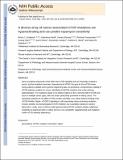A Diverse Array of Cancer-Associated MTOR Mutations Are Hyperactivating and Can Predict Rapamycin Sensitivity
Author(s)
Grabiner, Brian C.; Nardi, Valentina; Birsoy, Kivanc; Possemato, Richard; Shen, Kuang; Sinha, Sumi; Jordan, Alexander; Beck, Andrew H.; Sabatini, David; ... Show more Show less
DownloadSabatini_A diverse.pdf (2.500Mb)
OPEN_ACCESS_POLICY
Open Access Policy
Creative Commons Attribution-Noncommercial-Share Alike
Terms of use
Metadata
Show full item recordAbstract
Genes encoding components of the PI3K–AKT–mTOR signaling axis are frequently mutated in cancer, but few mutations have been characterized in MTOR, the gene encoding the mTOR kinase. Using publicly available tumor genome sequencing data, we generated a comprehensive catalog of mTOR pathway mutations in cancer, identifying 33 MTOR mutations that confer pathway hyperactivation. The mutations cluster in six distinct regions in the C-terminal half of mTOR and occur in multiple cancer types, with one cluster particularly prominent in kidney cancer. The activating mutations do not affect mTOR complex assembly, but a subset reduces binding to the mTOR inhibitor DEPTOR. mTOR complex 1 (mTORC1) signaling in cells expressing various activating mutations remains sensitive to pharmacologic mTOR inhibition, but is partially resistant to nutrient deprivation. Finally, cancer cell lines with hyperactivating MTOR mutations display heightened sensitivity to rapamycin both in culture and in vivo xenografts, suggesting that such mutations confer mTOR pathway dependency.
Significance: We report that a diverse set of cancer-associated MTOR mutations confer increased mTORC1/2 pathway activity and that cells harboring these mutations are highly sensitive to rapamycin in culture and in vivo. These findings are clinically relevant as the MTOR mutations characterized herein may serve as biomarkers for predicting tumor responses to mTOR inhibitors.
Date issued
2014-03Department
Massachusetts Institute of Technology. Department of Biology; Whitehead Institute for Biomedical Research; Koch Institute for Integrative Cancer Research at MITJournal
Cancer Discovery
Publisher
American Association for Cancer Research
Citation
Grabiner, B. C., V. Nardi, K. Birsoy, R. Possemato, K. Shen, S. Sinha, A. Jordan, A. H. Beck, and D. M. Sabatini. “A Diverse Array of Cancer-Associated MTOR Mutations Are Hyperactivating and Can Predict Rapamycin Sensitivity.” Cancer Discovery 4, no. 5 (March 14, 2014): 554–563.
Version: Author's final manuscript
ISSN
2159-8274
2159-8290